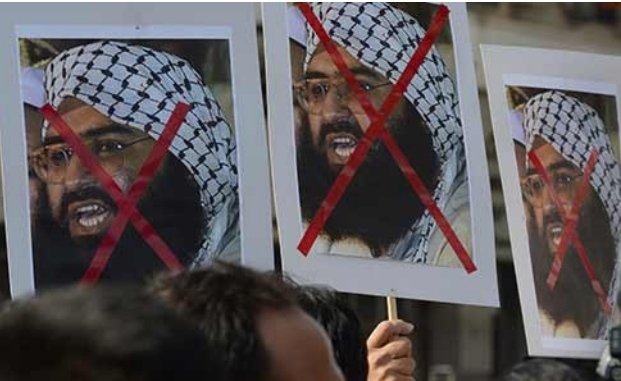Terrorist Dogs of Jaish-e-Muhammad Asks Pakistan’s Permisdion To Lift Restrictions on their Barking

Pakistan, fearing FATA backlash and of course a debilitating kick from India, had put a strong leash on JeM operations targeting Indian forces in Jammu and Kashmir. Now the Jaish-e-Muhammad has published a series of articles in its magazines and digital platforms calling on Prime Minister Imran Khan’s government to lift restrictions on jihadist groups, and enable operations across the Line of Control in support of the region’s secessionist movement.
“Talk to the preachers of power in the language of power”, a poem in the September 4 issue of the Jaish-e-Muhammad house-magazine Al-Qalam urges the Pakistan government. “Do not even mistakenly talk to the enemy with softness”.
Even though the Jaish-e-Muhammad has succeeded in staging some small-scale operations since Pulwama, and attempted an abortive car-bomb strike in June, it has hemorrhaged itself badly. Its personnel—among others, top Improvised Explosive Device maker Abdul Rehman was hunted down in a shootout with police.
Government data shows 17 terrorists either identified as Pakistanis or presumed to be foreign nationals have been killed in in Kashmir until August 31, down from 33 in 2019 and 64 in 2018. The figures, a senior intelligence official said, reflect the low levels of infiltration seen this year across the Line of Control.
Forty per cent of all terrorists hunted down in Kashmir through 2020, government sources say, were armed with only sidearms like automatic pistols—and in some cases had no weapon at all. “The jihadist movement in Kashmir is clearly facing a serious crisis of resources, from weapons to ammunition to training”, a senior police officer said.
Terrorists had hoped there would get help for their struggle from Kashmiri people but what they got instead is bullets from Indian Police and their names on some obscure gravestone if any.
“Lots of reasons exist for why Prime Minister Khan’s government fierce words on Kashmir aren’t matched by willingness to unleash the jihadists,” says Pakistani scholar Ayesha Siddiqa, a leading authority on jihadist groups in Pakistan. “Saudi Arabia has made it clear it isn’t enthused by the prospect of a crisis over Kashmir; there’s the threat of sanctions from the Financial Action Task Force; there’s the risk of war”.
Large numbers of Jaish-e-Muhammad combatants, Afghan intelligence officials say, were relocated to that country after the Indian Air Force struck at a Jaish training facility in Balakot last February. In April, Afghan troops destroyed what they said were Jaish bases in the country’s eastern Nangarhar province, feeding fighters to the Taliban.
Mohammad Ayoub Hussainkhail, commander of Afghan border forces in the country’s east, said “advanced weapons” were recovered from the bases, located in the Nangarhar’s Goraki area.
“There’s little doubt that Prime Minister Khan’s government has clamped down on the Kashmir jihad”, says Siddiqa. “The thing that’s important to remember, though, is that the jihadists have been controlled—not crushed”.
In 2019, following the Indian Air Force attack, the Pakistan government announced it had taken control of the Jaish’s seminary in the city of Bahawalpur—one of several key centres for the group’s operations. Large Jaish training facilities were also dispersed.
“General Pervez Musharraf tried to impose restrictions on the Kashmir struggle, but he failed and got mud on his face,” a recent article in al-Qalam says. “The movement emerged even more powerful in both military and non-military terms”
“These people also want to kill the movement,” the article went on. “They also want to wear a medal of peace—but don’t worry; things will change. They will fail. The morning will dawn when jihad will become prominent again”.




